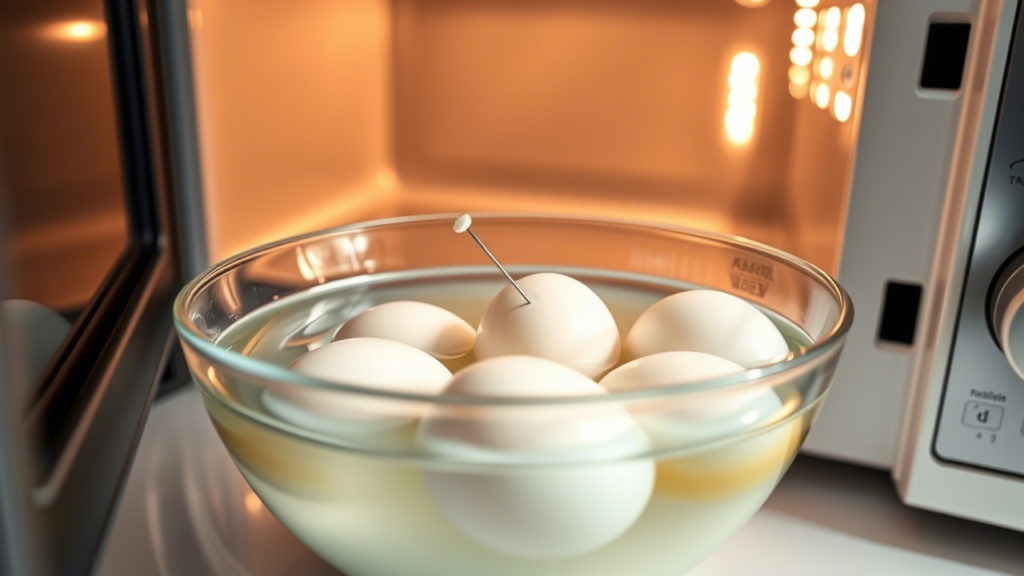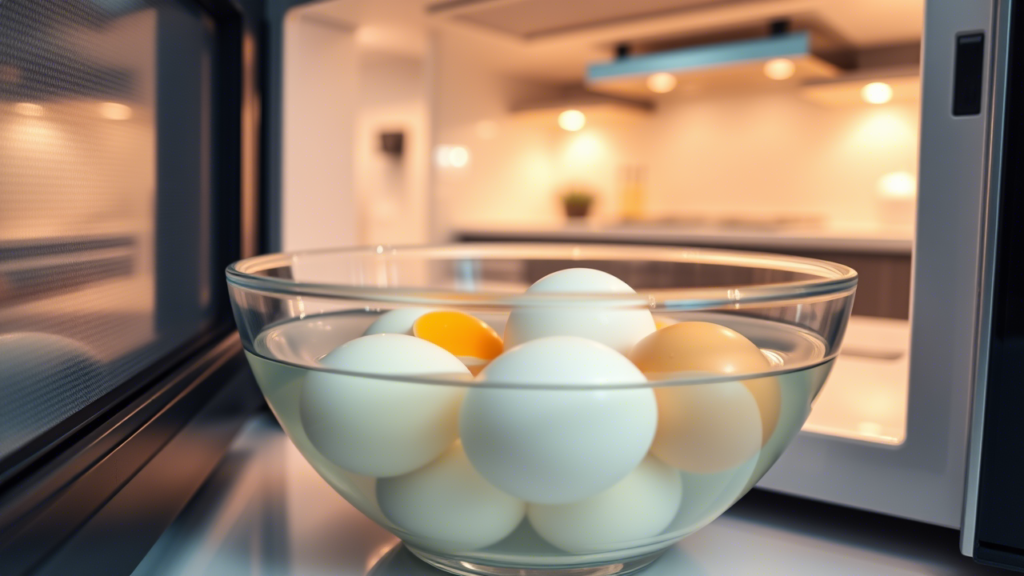Boiling eggs is a simple yet essential cooking skill, but what if you can’t access a stovetop? Many people ask how to boil eggs in the microwave when looking for a quick and efficient method. While microwaving eggs is convenient, improper techniques can lead to messy and dangerous explosions. This article provides a step-by-step guide to safely and effectively boil eggs in the microwave, ensuring perfect results every time.
Table of Biography for “How to Boil Eggs in the Microwave”
| Field | Details |
|---|---|
| Keyword | How to boil eggs in the microwave |
| Search Intent | Informational (How-to guide) |
| Difficulty Level | Easy to Moderate |
| Main Benefits | Time-saving, convenient, no stovetop needed |
| Primary Risks | Explosions if not done correctly |
| Required Tools | Microwave-safe bowl, water, eggs, pin/needle |
| Estimated Time | 5-7 minutes |
| Cooking Variations | Soft-boiled, medium-boiled, hard-boiled |
| Best Safety Tip | Always pierce the egg to release steam |
| Eco-Friendliness | Uses less energy than stovetop boiling |
| Common Mistakes | Not piercing eggs, using too much power, microwaving dry eggs |
| Alternative Methods | Boiling on stovetop, steaming, air fryer |
| Peeling Tips | Use an ice bath, add salt to water |
Can You Boil Eggs in the Microwave?
Yes, you can! However, microwaving whole eggs in their shells without proper preparation can cause them to explode. The microwave heats the egg rapidly, causing steam buildup inside the shell. Without an escape route for this steam, pressure builds up, leading to an explosion.
To prevent this, you must follow specific steps, including using a microwave-safe container, submerging the eggs in Water, and piercing the shell to allow steam to escape.
Why Use a Microwave Instead of a Stove?
While boiling eggs on the stove is the traditional method, using a microwave offers several benefits:
✅ Time-Saving – Microwaving eggs takes less time than boiling them on a stovetop.
✅ Less Cleanup – No need for extra pots or pans.
✅ Precision Control – You can monitor the process and adjust the cooking time for your preferred doneness.
However, the key to success is following the proper technique to avoid accidents.
Step-by-Step Guide: How to Boil Eggs in the Microwave
Follow these steps to safely and effectively boil eggs in the microwave.
1. Gather Your Supplies
To get started, you will need:
✔️ Fresh eggs
✔️ A microwave-safe bowl or mug
✔️ Cold Water
✔️ A pin or needle (to pierce the eggs)
✔️ Ice (for an ice bath)
2. Prepare the Eggs
Before placing eggs in the microwave, pierce the broader end of each egg with a pin or needle. This small hole allows steam to escape, preventing explosions. Be gentle—piercing too deeply can crack the egg.
3. Use the Right Container
Choose a deep microwave-safe bowl or mug large enough to fully submerge the eggs in Water. Glass or ceramic containers are ideal, as they distribute heat evenly.
4. Add Water
Fill the bowl with cold Water, ensuring the eggs are completely covered. The Water acts as a barrier, preventing direct heat from hitting the eggs too quickly. If the eggs are exposed to air, they may overheat and explode.

5. Microwave in Intervals
Instead of microwaving continuously, use short intervals:
🔹 Set your microwave to 50% power to avoid rapid heating.
🔹 Microwave for 30 seconds, then let the eggs sit in hot Water for 15-30 seconds.
🔹 Repeat this process in 30-second increments until you achieve the desired doneness.
Estimated Cooking Times (May Vary by Microwave Power)
- Soft-boiled eggs: 2-3 minutes
- Medium-boiled eggs: 3-4 minutes
- Hard-boiled eggs: 4-5 minutes
6. Transfer to an Ice Bath
Once the eggs reach the desired doneness, carefully remove them from the hot Water and place them in a bowl of ice water. This stops the cooking process and makes peeling easier. Let them sit for at least 5 minutes before peeling.
Tips for Perfect Microwave-Boiled Eggs
🔸 Always Pierce the Eggs – This is the most crucial step to prevent explosions.
🔸 Use Room Temperature Eggs – Cold eggs from the fridge may crack when exposed to hot Water.
🔸 Avoid Overheating – Cooking at full power can cause uneven heating and increase the risk of bursting.
🔸 Experiment with Timing – Every microwave is different, so adjust the cooking time based on wattage and the number of eggs.
🔸 Use Salt or Vinegar – Adding a teaspoon of salt or vinegar to the Water may help prevent cracking and make peeling easier.
Common Mistakes to Avoid
🚫 Skipping the Piercing Step – This almost guarantees an explosion.
🚫 Using a Metal Container – Microwaves should only be used with microwave-safe bowls.
🚫 Microwaving at Full Power – This can overheat the eggs too quickly.
🚫 Leaving Eggs Unsubmerged – Eggs must be fully covered with Water to cook evenly and safely.
🚫 Not Using an Ice Bath – Eggs may continue cooking and become overcooked without an ice bath.
Frequently Asked Questions
1. Can I microwave eggs without Water?
No! Microwaving eggs without Water is extremely dangerous and will likely result in an explosion. Always submerge the eggs in Water before cooking.
2. What should I do if my egg explodes in the microwave?
If an egg explodes, carefully clean the microwave with warm Water and vinegar to remove any residue. Next time, ensure the egg is adequately pierced and fully submerged in Water.
3. How can I make peeling easier?
An ice bath immediately after cooking helps loosen the shell, making peeling much more manageable. Adding salt or vinegar to the boiling water can also help.
4. Is microwaving eggs eco-friendly?
Yes! Microwaving eggs uses less energy than boiling Water on a stovetop, making it an eco-friendly cooking method. It also reduces water waste, as you only need enough Water to submerge the eggs.

Last Reviews
Learning how to boil eggs in the microwave is a game-changer for anyone looking for a quick, mess-free method. By following the proper steps—piercing the eggs, using a microwave-safe container, submerging them in Water, and cooking in intervals—you can enjoy perfectly boiled eggs in just a few minutes.
Experimenting allows you to find the perfect cooking time for your microwave and personal preference. Whether you prefer soft, medium, or hard-boiled eggs, the microwave can be a convenient and efficient way to prepare them. Just remember: safety first!
Now that you know the best way to boil eggs in the microwave, why not try it? Happy cooking!


Pingback: How Many Ounces in a Pound? A Detailed Guide - glowmagazine.co.uk